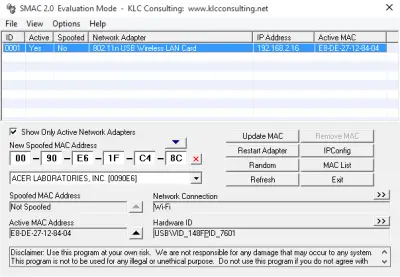

Int.to_bytes(0, 2, 'little', signed=False) + # nlmsg_seq Int.to_bytes(NLM_F_REQUEST | NLM_F_ROOT, 2, 'little', signed=False) + # nlmsg_flags Int.to_bytes(RTM_GETADDR, 2, 'little', signed=False) + # nlmsg_type Int.to_bytes(0, 4, 'little', signed=False) + # nlmsg_len S = socket.socket(socket.AF_NETLINK, socket.SOCK_RAW)
#Can you use a random alternate mac address code
If you want to do it the hard (but maybe fast?) way, here's some rough Netlink ( RFC 3549) code (probably Linux only) which gets both IPv4 and IPv6, with just one import statement from the standard library: import socket Type "help", "copyright", "credits" or "license" for more information. strip(':') for l in result if l.isdigit()]Īnd you would have something like this: python3 split('/') for l in result if "inet" in l]Īdditionally, you can use a similar approach for obtaining a list of NICs: def get_nics():

Ipaddress from the NIC provided as parameter. Network Interface Card used for the query. So, here I provide the approach, using subprocess and list comprehensions for the sake of functional approach and fewer lines of code: import subprocess as sp I had this as part of an application that I developed long time ago, and I didn't wanted to simply git rm script.py. Yet another way of obtaining the IP address from a NIC, using Python. If I run get_ip('both', False), it returns If ipaddress.ip_address(ip).is_loopback and ignore_local_ips or ipaddress.ip_address(ip).is_link_local and ignore_local_ips: System_ip_list = getaddrinfo(gethostname(), None, af_inet, 1, 0) # Can combine options like so get_ip('both', False) # To return local IPs, call get_ip(None, False) # To return both IPv4 and IPv6, call get_ip('both') # To return IPv6 only, call get_ip('ipv6') # By default, this method only returns non-local IPv4 addresses from socket import getaddrinfo, gethostnameĭef get_ip(ip_addr_proto="ipv4", ignore_local_ips=True): This can also be edited to allow for IPv6 only, or both IPv4 and IPv6, as well as allowing loopback/link-local in the IP address list. This will gather all IP addresses on the host and filter out loopback/link-local and IPv6. Ipv6 = os.popen('ip addr show eth0').read().split("inet6 ").split("/")īut in this case you have to check the bounds of the array returned by each split() call. I have been asked to add \'').read().strip()Īlternatively, you can shift part of the parsing task to the Python interpreter by using split() instead of grep and AWK, as Sergiy Kolodyazhnyy points out in the comment: import os When an error occurs in a Python script on Unix, an email is sent.


 0 kommentar(er)
0 kommentar(er)
